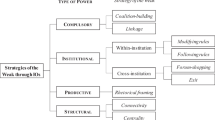Abstract
The aim of this article is to offer a synthesis of what is termed here a power-analytical approach to global security regimes. The considered and prominent cases of prohibition/regulatory security regimes fall into three security clusters: a humanitarian cluster (small arms and light weapons, anti-personnel landmines, and cluster munitions), a WMD cluster (chemical, biological, and nuclear weapons), and an “unconventional” cluster (drugs and cyber weapons). Drawing on the thorough theoretical and empirical approach, the following synthesis is structured—and regimes compared—along four major categories. These four categories have been distilled from the power-analytical approach and empirical workings of the respective regimes. They are: perennial relevance of productive power; contingent systems of differentiation; real/imagined military/security centrality; and manipulation of categories. Importantly, they allow us to capture the most prominent features among the rich variety of cases. Therefore, they are reflective of both conceptual vocabulary and the multiple empirical realities of the examined regimes, thus greatly contributing not only to the existing, yet piecemeal regimes theorisation but also to empirical variability across the board.
Similar content being viewed by others
References
Barnett, M.N., and R. Duvall. 2005. Power in International Politics. International Organization 59(1): 39–75.
Bourne, M. 2017. Powers of the Gun: Process and Possibility in Global Small Arms Control. International Politics. doi:10.1057/s41311-017-0080-6.
Gale, F. 1998. ‘Cave “Cave! Hic Dragones”: A Neo-Gramscian Deconstruction and Reconstruction of International Regime Theory. Review of International Political Economy 5(2): 252–283.
Gill, S. 1993. Epistemology, Ontology and the Italian School. In Gramsci, Historical Materialism and International Relations, ed. S. Gill, 21–48. Cambridge: Cambridge University Press.
Gill, S. 1995. Globalisation, Market Civilisation and Disciplinary Neoliberalism. Millennium: Journal of International Studies 24(3): 399–423.
Gill, S. 2001. Constitutionalising Capital: EMU and Disciplinary Neo-Liberalism. In Social Forces in the Making of New Europe: The Restructuring of European Social Relations in the Global Political Economy, ed. A. Bieler and A. D. Morton, 47–69. Basingstoke: Palgrave Macmillan.
Guzzini, S. 1993. Structural Power: The Limits of Neorealist Power Analysis. International Organization 47(3): 443–478.
Hynek, N. 2017a. Theorizing International Security Regimes: A Power-Analytical Approach. International Politics. doi:10.1057/s41311-017-0084-2.
Hynek, N. 2017b. From Landmines to Cluster Munitions, and Jointly to the Stars? A Power-Analytical Reading of Humanitarian Prohibition Politics. International Politics. doi:10.1057/s41311-017-0082-4.
Krause, K. 2002. Multilateral Diplomacy, Norm Building and UN Conferences: The Case of Small Arms and Light Weapons. Global Governance 8(2): 247–263.
Lake, D.A. 2011. Why “isms” Are Evil: Theory, Epistemology, and Academic Sects as Impediments to Understanding and Progress. International Studies Quarterly 55(2): 465–480.
Latour, B. 2005. Reassembling the Social. Oxford: Oxford University Press.
Newell, P. 2005. Race, Class and the Global Politics of Environmental Inequality. Global Environmental Politics 5(3): 70–94.
Newell, P. 2008. The Political Economy of Global Environmental Governance. Review of International Studies 34(3): 507–529.
Price, R.M. 1995. A Genealogy of the Chemical Weapons Taboo. International Organization 49(1): 73–103.
Price, R.M. 1997. The Chemical Weapons Taboo. Ithaca, NY: Cornell University Press.
Reus-Smit, C. 2013. Beyond Metatheory? European Journal of International Relations 19(3): 589–608.
Revill, J. 2017. ‘Muddling Through’ in the Biological and Toxin Weapons Convention. International Politics. doi:10.1057/s41311-017-0085-1.
Robinson, W.I. 2005. Gramsci and Globalisation: From Nation-State Transnational Hegemony. Critical Review of International Social and Political Philosophy 8(4): 559–574.
Ruzicka, J. 2017. Behind the veil of good intentions: Power analysis of the nuclear non-proliferation regime. International Politics. doi:10.1057/s41311-017-0086-0.
Sánchez-Avilés, C., and O. Ditrych. 2017. The Global Drug Prohibition Regime: Prospects for Stability and Change in an Increasingly Less Prohibitionist World. International Politics. doi:10.1057/s41311-017-0081-5.
Stevens, T. 2017. Cyberweapons: Power and the Governance of the Invisible. International Politics. doi:10.1057/s41311-017-0088-y.
Strange, S. 1982. Cave! Hic Dragones: A Critique of Regime Analysis. International Organization 36(2): 479–496.
Strange, S. 1994. States and Markets, 2nd ed. London: Pinter.
Tannenwald, N. 1999. The Nuclear Taboo: The United States and the Normative Basis of Nuclear Non-Use. International Organization 53(3): 433–468.
Tannenwald, N. 2007. The Nuclear Taboo: The United States and the Non-Use of Nuclear Weapons Since 1945. Cambridge: Cambridge University Press.
Tannenwald, N. 2015. Normative Strategies of Disarmament. In Global Nuclear Disarmament: Strategic, Political, and Regional Perspectives, ed. N. Hynek, and M. Smetana, 107–122. Abingdon: Routledge.
Author information
Authors and Affiliations
Corresponding author
Additional information
The research conducted for the purposes of this article was supported by the Czech Science Foundation Grant 13-26485S Global Prohibition Regimes: Theoretical Refinement and Empirical Analysis.
Rights and permissions
About this article
Cite this article
Stritecky, V., Hynek, N. Comparing global security regimes: a power-analytical synthesis. Int Polit 55, 503–517 (2018). https://doi.org/10.1057/s41311-017-0089-x
Published:
Issue Date:
DOI: https://doi.org/10.1057/s41311-017-0089-x




